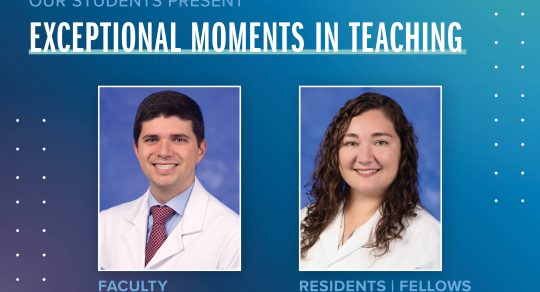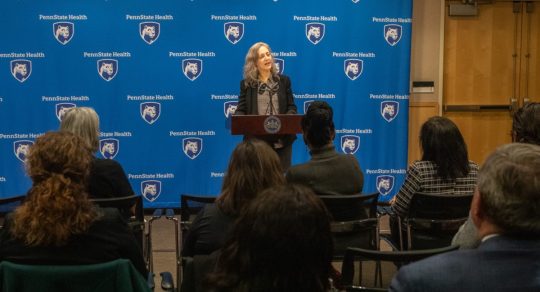Residency
Obstetrics and Gynecology
The Obstetrics and Gynecology Residency at Penn State Health Milton S. Hershey Medical Center is a four-year, ACGME-accredited program that admits five residents per year.
Explore More
The comprehensive Obstetrics and Gynecology Residency at Penn State Health/Penn State College of Medicine exposes residents to the full range of obstetric and gynecologic specialties and subspecialties under the supervision of more than 30 faculty members committed to resident education. The educational program is based on the objectives created by the Council on Resident Education in Obstetrics and Gynecology (CREOG).
The educational program is based on the objectives created by the Council on Resident Education in Obstetrics and Gynecology (CREOG). During the first year, residents are exposed to the basics of the specialty, including: active participation in the operating room with women’s health, oncology, minimally invasive gynecologic surgery and urogynecology and pelvic reconstructive surgery. The second and third years expand the exposure to the specialties of reproductive endocrinology and infertility, minimally invasive gynecologic surgery and maternal-fetal medicine. Finally, during the fourth year, residents are managing the oncology, urogynecology and pelvic reconstructive surgery, obstetric and gynecologic services. During the entire four years, weekly didactic time is protected and a night float system is in place to both augment and facilitate learning.

Program Overview
Overall, the departmental mission is to become the clinical, educational and research resource of choice for all women of central Pennsylvania and their health care providers. The program strives to teach resident colleagues the basic and advanced skills necessary not just to practice obstetrics and gynecology, but to become the consultant of choice in their community and to keep the way open for further study in the advancement of women’s health care.
Doing so in an environment that is busy and demanding, but not exhausting, makes this program special. The residents, faculty and staff make it exceptional.
Learn More about the Residency
General Application Information
The Obstetrics and Gynecology Residency participates in ResidencyCAS.
Interview Process
Interviews are granted to exceptional candidates following receipt of a complete ResidencyCAS application. Interview invitations are emailed, generally beginning around early October.
Interview days are generally Wednesdays and Thursdays in November and December. Sessions begin with a welcome and program overview from the program director, associate program director and department chair. Interviewees will then speak individually with faculty members, fellows and residents.
Upon accepting the invitations to interview, candidates are sent specific instructions from the program coordinator outlining the interview day.
Leadership
Supporting Your Training
Curriculum Details
Incoming residents are provided with both a general institutional and department-specific orientation program. The institutional orientation provides an overview of the Graduate Medical Education office, employment requirements, HR benefits and integrated hospital systems (IT, imaging).
Departmental orientation comprises two to three days covering instruction on the electronic medical record, departmental policies, tours of the labor and delivery unit and operating room and other required onboarding. The Basics of Obstetrics and Gynecology (BOG) lecture series has been designed to be specific for interns to provide essential knowledge about the most pertinent topics in obstetrics and gynecology. Examples of BOG lectures include how to perform a c section and repair a vaginal laceration, how to interpret a fetal strip, managing common complications post operative and many more. Incoming residents will also spend time learning the process of a.m. and p.m. rounds and sign-outs.
All interns, as part of the orientation process, participate in the ALSO Course (Advanced Life Support in Obstetrics). This is done in conjunction with the Family and Community Medicine Residency (Hershey, Pa.) and occurs during June orientation activities.
Obstetrics
Hours are from 5:30 a.m. to 5:30 p.m. Rounding on the postpartum patients is done before team sign-out with faculty at 6:45 a.m. Obstetrics residents participate in perinatal conference on Fridays.
In the first half of the year, two PGY-1 residents are on the obstetric service with one resident covering day shift and one resident covering night float. They divide their responsibilities between labor and delivery and floor coverage of antepartum and postpartum patients. A Family and Community Medicine resident and a certified nurse midwife are also part of the team and work closely with the obstetrics residents.
Responsibilities include managing patients in labor and delivery under the supervision of the PGY-4 resident. Triage, admissions, labor/delivery, recovery and primary C-sections are covered by one of the interns. Floor responsibilities include: managing postpartum magnesium patients, postpartum patients, contraception counseling, postpartum depression screening and breastfeeding issues.
Gynecologic Oncology
The average day is 12 hours. Rounds are done on inpatients with the PGY-1 resident. One to two days a week are spent in the operating room. The resident scrubs on all major cases, with open, straight-stick laparoscopy and robotic cases. One to two days a week are spent in the outpatient clinic with the PGY-1 residents and faculty. The resident on this rotation also participates in twice-monthly multidisciplinary pathology case conference.
Gynecology
The average day is 12 hours. The day begins with rounds with the team and the faculty before the OR start at 7:30 a.m. Interns are responsible for making sure the preoperative notes and orders are written the night prior to the surgery. The intern is expected to scrub for major and participate in minor OR cases. Residents also attend surgical cases scheduled at the Outpatient Surgery Center at the east end of campus.
Night Float
Night float hours are Sunday from 7 p.m. to 7:15 a.m. and from 5:30 p.m. to 7:15 a.m. Monday through Thursday. The direct supervisor is a PGY-3 or PGY-4 resident and the on-call faculty attending/fellow. The PGY-1 resident on this rotation shares responsibility of: labor and delivery, postpartum patients, nurse triage phone calls, ER consults and all in-house gynecologic or gynecologic/oncology patients with a PGY-2 or PGY-3 resident. There is a faculty attending covering gynecology backup and a Maternal Fetal Medicine attending covering obstetrical backup at home each night to support in house coverage. Residents attend Friday morning perinatal conference led by the Division of Maternal-Fetal Medicine and the Neonatal Intensive Care Unit. While on night float, residents are excused from Wednesday afternoon didactics, but are expected to attend Thursday morning meetings.
Minimally Invasive Gynecologic Surgery
The average day is 12 hours. Inpatient rounds are conducted before the OR start at 7:30 a.m., two or three days of the week. OR cases are mainly straight-stick laparoscopy or robotics. The remaining days are spent with minimally invasive gynecologic surgery faculty and fellows in the outpatient setting, consisting of pre-and post-operative patients and consults. Residents work one-on-one with faculty on laparoscopic skills using the trainer in the SIM Center and to prepare for the EMIGS test.
Family Planning
The average day is eight to nine hours. Interns participate with Early Pregnancy and Contraception clinics at Hope Drive staffed by the Complex Family Planning attendings. There is also the opportunity to scrub for add-on OR cases by the faculty as the need arises from patients seen in clinic. The intern is responsible to present a topic of their choice for all residents during weekly education, towards the end of the block. Interns accompany the Complex Family Planning faculty at Planned Parenthood on Fridays. Interns are supported to participate in patient care to the extent that the resident feels comfortable with.
Urogynecology
The average day is 12 hours. This begins with rounds before 7:30 a.m. OR begins. The resident’s primary role will be with all areas to develop and increase their surgical skills. Residents on this rotation are supervised by the PGY-4 Resident and Faculty.
Night Float/Gyn
Night float hours are Sunday from 7 p.m. to 7:15 a.m. and from 5:30 p.m. to 7:15 a.m. Monday through Thursday. The direct supervisor is a PGY-3 resident and the on-call faculty/fellow. The PGY-2 resident on this rotation shares responsibility of labor and delivery, postpartum patients, nurse triage phone calls, ER consults and all in-house gynecologic or gynecologic/oncology patients with a PGY-3 resident. A gynecologic back-up physician and maternal-fetal medicine physician are on home call nightly. Friday mornings, residents attend perinatal conference run by the Division of Maternal-Fetal Medicine and the Neonatal Intensive Care Unit.
Reproductive Endocrinology And Infertility
The average day is eight to nine hours. The day begins with assisting on in vitro fertilization monitoring and then transitions into the daily morning ultrasound session. The resident will assist with artificial reproductive techniques such as intrauterine insemination, oocyte retrievals and embryo transfers. The remainder of the day is spent in the outpatient setting with new and returning patients one-on-one with the attending. The resident assists faculty in the operating room each Wednesday. Cases are mostly robotic/laparoscopic/hysteroscopic with occasional open myomectomies.
Family Planning
The average day is eight to nine hours. Interns participate with Early Pregnancy and Contraception clinics at Hope Drive staffed by the Complex Family Planning Attendings. There is also the opportunity to scrub for add on OR cases by the faculty as the need arises from patients seen in clinic. The intern is responsible to presenting on a topic of their choice for all residents during weekly education towards the end of the block. Interns accompany the Complex Family Planning faculty on Fridays to Planned Parenthood on Fridays. Interns are supported to participate in patient care to the extent that the resident feels comfortable with.
Maternal-Fetal Medicine
There are two residents on the MFM service with one designated to inpatient care and the other participating in outpatient care. The average day is 12 hours for the inpatient resident and 8-9 hours for the outpatient resident. Rounds on the antepartum maternal-fetal medicine service are conducted by the inpatient resident before OB sign-out at 6:45 a.m. The resident meets with the oncoming obstetric team to update them on the service and obtain feedback from outgoing Night Float personnel. Formal rounds are then conducted with the fellows and/or the faculty of the day. The outpatient resident reports to the clinic at 8 a.m. on most week days. Responsibilities include seeing returning patients, consults, ultrasound and interpreting non-stress tests. Time is also spent with the genetic counselor. Common areas to learn include diabetes management (gestational and pre-gestational), hypertension, coagulopathies and newly diagnosed anomalies. The resident on this rotation is responsible for presenting part of the perinatal conference on Fridays.
Research
This rotation is designed to increase exposure to bench research, research concepts and quality improvement, and to provide time for residents to begin their mandatory research project. Some clinical office and surgical care is performed on the rotation.
Reproductive Endocrinology And Infertility
The average day is eight to nine hours. The day begins with assisting on in vitro fertilization monitoring and then transitions into the daily morning ultrasound session. The resident assists with artificial reproductive techniques such as intrauterine insemination, oocyte retrievals and embryo transfers. The remainder of the day is spent in the outpatient setting with new and returning patients one-on-one with the attending. The resident assists faculty in the operating room each Wednesday. Cases are mostly robotic/laparoscopic/hysteroscopic with occasional open myomectomies. The resident’s level of participation and involvement increases as their exposure and educational level increases.
Maternal-Fetal Medicine
There are two residents on the MFM service with one designated to inpatient care and the other participating in outpatient care. The average day is 12 hours for the inpatient resident and 8-9 hours for the outpatient resident. Rounds on the antepartum maternal-fetal medicine service are conducted by the inpatient resident before OB sign-out at 6:45 a.m. The resident meets with the oncoming obstetric team to update them on the service and obtain feedback from outgoing Night Float personnel. Formal rounds are then conducted with the fellows and/or the faculty of the day. The outpatient resident reports to the clinic at 8 a.m. on most week days. Responsibilities include seeing returning patients, consults, ultrasound and interpreting non-stress tests. Time is also spent with the genetic counselor. Common areas to learn include diabetes management (gestational and pre-gestational), hypertension, coagulopathies and newly diagnosed anomalies. The resident on this rotation is responsible for presenting part of the perinatal conference on Fridays.
Night Float
Night float hours are Sunday from 7 p.m. to 7:15 a.m. and from 5:30 p.m. to 7:15 a.m. Monday through Thursday. The direct supervisor is a PGY-3 or PGY-4 resident and the on-call faculty attending/fellow. The PGY-1 resident on this rotation shares responsibility of labor and delivery, postpartum patients, nurse triage phone calls, ER consults and all in-house gynecologic or gynecologic/oncology patients with a PGY-2 or PGY-3 resident. There is a faculty attending covering gynecology backup and a Maternal Fetal Medicine attending covering obstetrical backup at home each night to support in house coverage. Residents attend Friday morning perinatal conference led by the Division of Maternal-Fetal Medicine and the Neonatal Intensive Care Unit. While on Night Float, residents are excused from Wednesday afternoon didactics, but are expected to attend Thursday morning meetings.
Minimally Invasive Gynecologic Surgery
The average day is 12 hours. Inpatient rounds are conducted before the OR start at 7:30 a.m., two or three days of the week. OR cases are mainly straight-stick laparoscopy or robotics. The remaining days are spent with minimally invasive gynecologic surgery faculty and fellows in the outpatient setting, consisting of pre-and post-operative patients and consults. Residents work one on one with faculty on laparoscopic skills using the trainer in the SIM Center and to prepare for the EMIGS test.
Outpatient
The average day is from 8 a.m. to 5 p.m. The resident will participate in weekly clinics including colposcopy, contraception, acute needs and medical student teaching clinics. On Tuesdays and Fridays, the resident on this rotation will lead ICC-intermediate care obstetrics clinics. On Wednesdays, the resident serves as the labor and delivery chief to allow the PGY-4 obstetrics resident to participate in continuity clinic. Friday assignments include time for phone calls and administrative tasks.
Elective
This rotation consists of one consecutive five-week block. The resident will work in conjunction with a faculty member to design an elective with appropriate goals and objectives, and measurable outcomes. The resident will submit the final proposal to Residency Program leadership for approval, and to the GME office, if requesting an elective outside of the Penn State Health system.
Gynecology
The average day is 12 hours. The day begins with rounds conducted before the OR start at 7:30 a.m. The resident’s primary role will be to increase surgical skills as a chief resident. Responsibilities also include overseeing PGY-1 residents and medical student teaching.
Night Float
Night float hours are Sunday 7 p.m. to 7:15 a.m., and 5:30 p.m. to 7:15 a.m. Monday through Thursday. Responsibilities include supervising and teaching PGY-1 and PGY-2 residents and medical students. This resident covers the maternal-fetal medicine floor, inpatient gynecologic and oncology services, phone triage and ER consults.
Gynecologic Oncology
The average day is 12 hours. Rounds are done on inpatients with the PGY-1 resident. One to two days a week are spent in the operating room. The resident scrubs on all major cases, with open, straight-stick laparoscopy and robotic cases. One to two days a week are spent in the outpatient clinic with the PGY-1 residents and faculty. The resident on this rotation also participates in twice-monthly multidisciplinary pathology case conference.
Urogynecology
The average day is 12 hours. This begins with rounds before the start of OR at 7:30 a.m. The resident’s primary role will be with all areas to increase their surgical skills. Residents on this rotation are supervised by Faculty and may assist in the supervision of PGY-2 Residents.
Obstetrics
The average day is 12 hours. The resident on this rotation assists the maternal-fetal medicine service, night float senior and PGY-1 residents with any patient care rounds, and also rounds on the women’s health antepartum patients. The resident participates in Obstetric sign-out at 6:45 a.m. This resident’s main responsibility is to teach the PGY-1 and to have primary responsibility for the running of the labor and delivery and postpartum floors. This resident also teaches the medical students while continuing training on high-risk management in labor and delivery, operative vaginal delivery and operative obstetrics. The resident will lead sign-out at 5:30 p.m. Residents on this rotation will attend perinatal conference on Fridays.
Outpatient
The average day is from 8 a.m. to 5 p.m. The resident will participate in weekly clinics including colposcopy, contraception, acute needs and medical student teaching clinics. On Tuesdays and Fridays, the resident on this rotation will lead ICC-intermediate care obstetrics clinics. On Wednesdays, the resident serves as the labor and delivery chief to allow the PGY-4 obstetrics resident to participate in continuity clinic. Friday assignments include time for phone calls and administrative tasks.
A formal didactic curriculum, administered by departmental faculty, is established as protected time for all residents.
The Basic Obstetrics and Gynecology (BOG) lecture series is designed for the PGY-1 residents and is held in the first two months of residency. These lectures occur three times per week. Selected topics provide fundamental training in common obstetrics and gynecology issues.
The Wednesday education series is a repeating two-year curriculum which covers all of the CREOG educational objectives. With a few exceptions, the resident educational program is concentrated into these weekly Wednesday afternoon sessions from 1:00 to 5:00 p.m. Additionally, Residents and Leadership meet one Thursday morning per month from 7:00 to 7:50 a.m. The conferences held during this time period include:
Chair’s rounds
Chapter review
Journal club
Faculty lecture series
Grand Rounds
Simulation labs (approximately four per year)
Residency meetings
CREOG and board review lectures
In addition to the Wednesday afternoon education, residents have the opportunity to participate in:
Oncology/pathology reviews
Perinatal and neonatal intensive care unit Friday conference
Maternal-fetal medicine fellow education topics
Monthly GME-sponsored lectures
Research Requirement
Research is a valued and important part of resident education. Completion of a formal research project is required for graduation from the program. Research projects are either resident- or faculty-initiated. Residents must devise and propose their research to the Institutional Review Board during the PGY-2 year and conduct enrollment during the PGY-3 year. Each PGY-4 resident must present at the annual Resident/Fellow Research Day. Residents are encouraged to publish their presentation. Residents also have opportunities for other projects at their discretion.
Protected Time
PGY-2 residents spend 5 weeks on a research rotation. This includes exposure to bench research, research concepts and quality improvement, and time to design and begin the mandatory research project.
Conferences
Attendance at regional and national conferences is strongly encouraged. Residents are provided with annual funds for Educational Support purposes, and may apply for additional department funding for first author presentations at national conferences.
All residents are provided with the opportunity to select a formal faculty mentor half way through the PGY1 year, although it is not required. Many residents will seek support and guidance for various aspects of their training such as a research mentor or surgical coach. The mentor should be a faculty member who is able to best support that resident’s personal and professional growth. The mentor can also serve as an advocate during reviews and meetings with departmental leadership.
All residents are expected to contribute toward the development of medical students. At any one time, most services will have from one to three students assigned. Teaching is usually on a one-to-one basis during rounds or at the patient bedside. Residents may additionally develop more formal “lectures” on an individual basis.
Students accompany the residents throughout daily team activities with the exception of time to attend their own noon lecture series. There is no “protected” time for student teaching built into the schedule.
In order to improve teaching skills, quarterly lectures are provided to the residents by the GME office.
Residents are evaluated frequently during the course of training. This includes daily to weekly review of procedures and patient care and end-of-rotation summary evaluations. Periodic 360-degree evaluations are also provided by inpatient and outpatient clinical and support staff. Residents also complete semi-annual self-assessments to assist in planning for individual goals and educational needs.
Each resident reviews their portfolio twice yearly with the program director or the associate program director. During this interaction, milestone evaluation progress, end of rotation evaluations, and self-assessments are reviewed.
The review of procedures and patient-care evaluations are done real-time at the end of encounters so directed feedback can be elicited. A form is then generated to complete milestone assessments.
In addition, all residents sit for the CREOG in-service exam once each academic year. Exam scores are not used as a measure for advancement, rather they are used to help structure an education program and highlight strengths and weaknesses for individual residents. Each resident meets with the Program Director to discuss their scores and areas in which they could benefit from additional study.
Residents who may benefit from a more formal, structured educational program are paired with a mentor who provides guidance in this endeavor. The mentor then devises a program in conjunction with the resident and program director.
Residents provide ongoing feedback at monthly resident/residency program leadership meetings and during the course of rotations. Formal reviews of the curriculum and program occur yearly. The residents evaluate each rotation upon completion. They also anonymously evaluate supervising faculty at the end of each rotation. Residents also complete an evaluation of the Wednesday education curriculum each year.
A comprehensive review of the curriculum occurs each year with the above information and input from residents and the Program Evaluation Committee.
The residency has placed residents in gynecologic oncology, maternal-fetal medicine and minimally invasive gynecologic surgery fellowships. The department offers two fellowships:
Resident Honors and Recognitions
Penn State College of Medicine and Penn State Health Milton S. Hershey Medical Center accept ongoing nominations for the Exceptional Moments in Teaching award.
The award, given monthly by the Office for a Respectful Learning Environment, accepts nominations from College of Medicine students who are invited to submit narratives about faculty members, residents, fellows, nurses or any other educators who challenge them and provide an exceptional learning experience. See more about the award here.
The annual Resident/Fellow Research Day is held each year (with exception of during the COVID-19 pandemic) on and around the Penn State Health Milton S. Hershey Medical Center campus.
The intent of the event is to provide an opportunity for residents and fellows to showcase their research accomplishments to their peers in other clinical departments, as well as their colleagues in the basic sciences.
Learn more about Resident/Fellow Research Day here.
Previous presentations from the Obstetrics and Gynecology Residency are listed here.
Contact Information
Mailing Address
Penn State Health Milton S. Hershey Medical Center
Department of Obstetrics and Gynecology
500 University Dr.
P.O. Box 850, MC H103
Hershey, PA 17033-2390
General Contact Information
Fax: 717-531-0197






